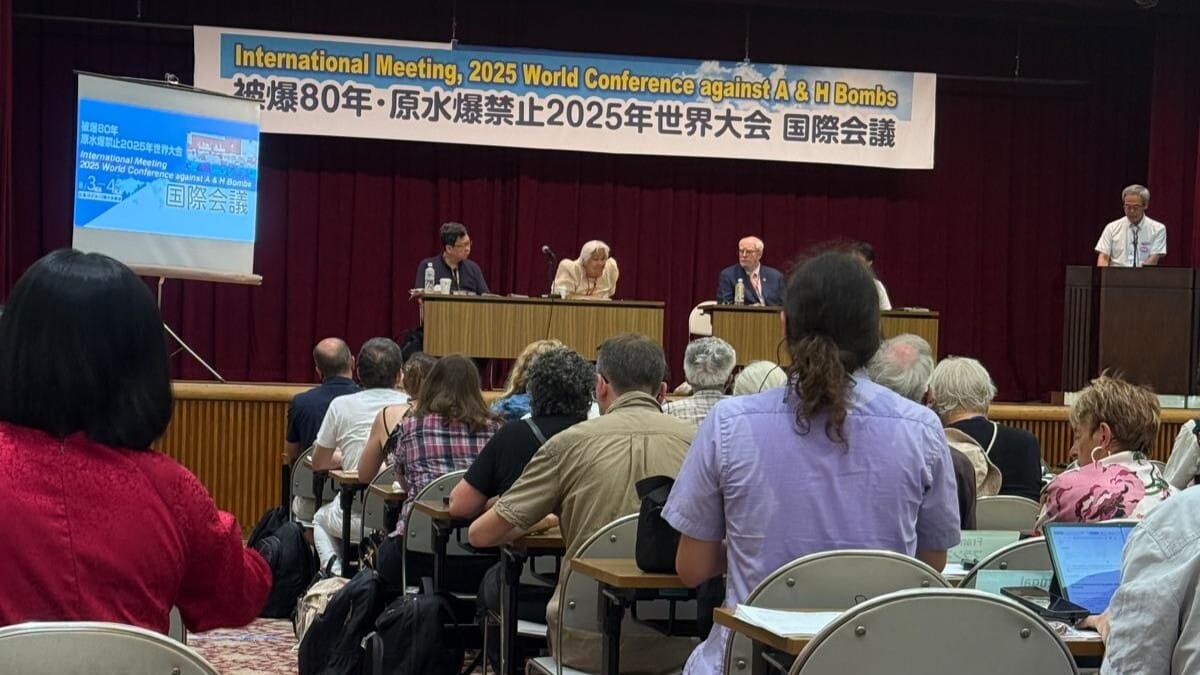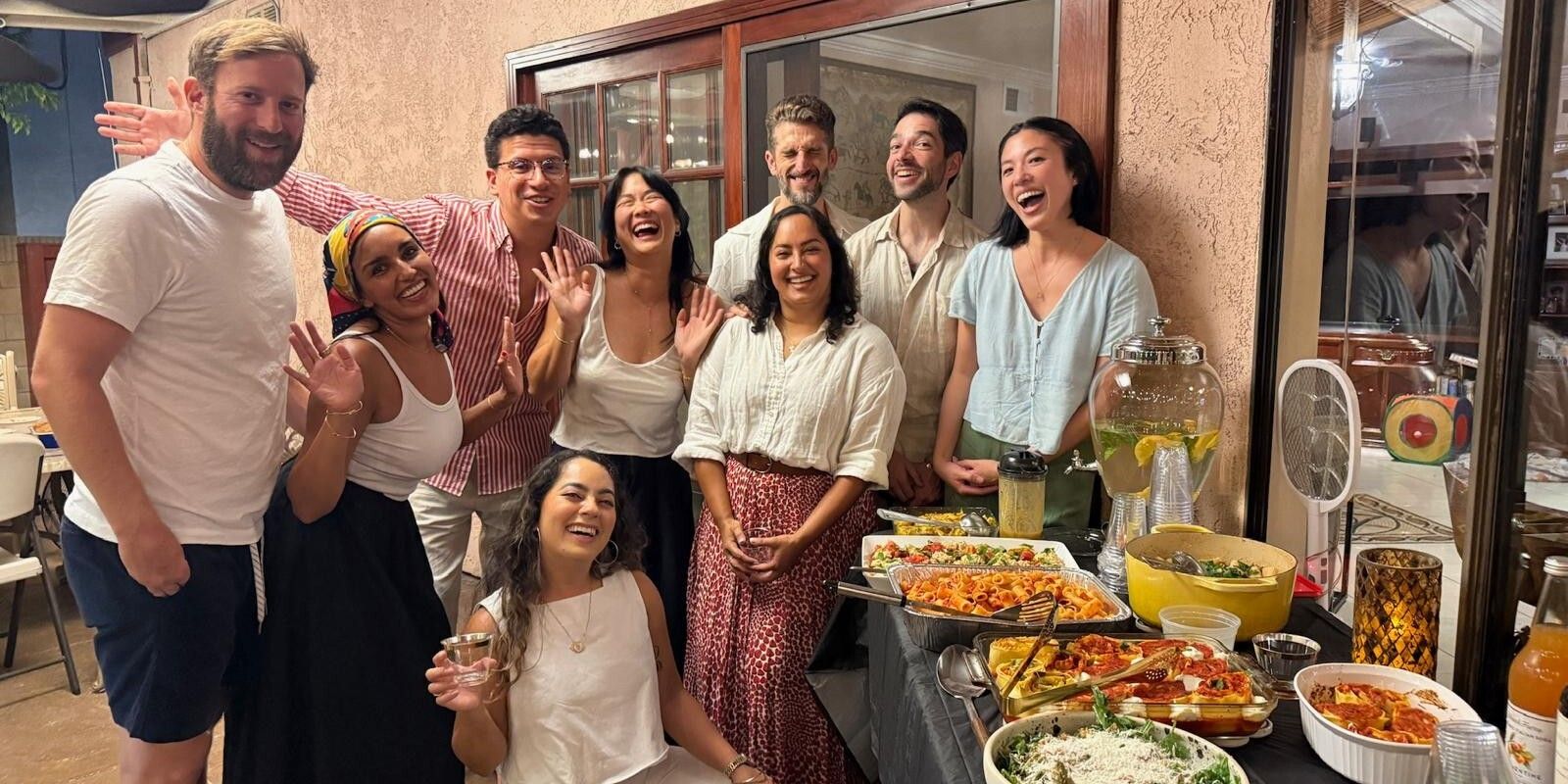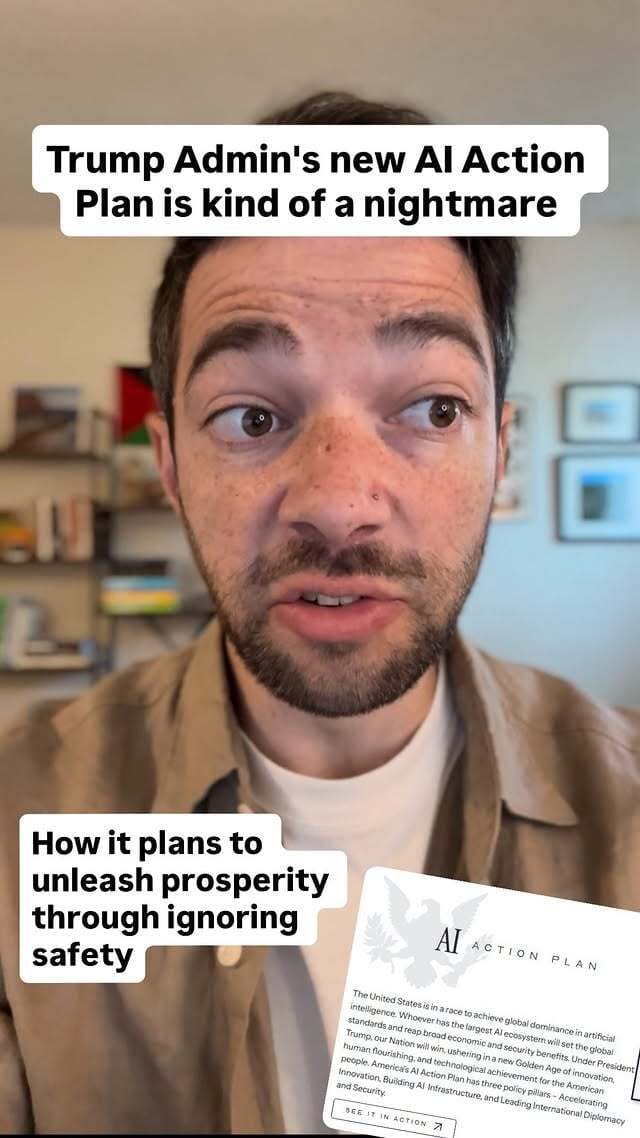Welcome to my (new) newsletter

A meeting of international delegates from the 2025 World Conference against A & H Bombs that I attended, in Hiroshima, Japan
Hello and welcome to a brand new newsletter (and maybe welcome from Substack, as I’ve ported my subscribers over to this new platform).
I’ve decided to try writing a bi-weekly (don’t hold me to that) newsletter to create a more organized place for anyone interested in the work I’m doing or events I’m part of. In my lines of work — scholarship, teaching, and political organizing — there are so many events I become part of, interesting pieces I read, and articles I write. One of my goals as an educator and political organizer is to facilitate thoughtful lives. Keeping all the reading, writing, and teaching inside of academia is no way to do that. In fact, I believe that academia being so closed off to the public is one of the reasons we have the society we do, where thoughtful reflection and dialogue are somehow not part of daily life. Let’s try to fix that in a small way.
I hope that what I include in this newsletter helps you to learn some interesting things and facilitates discussion and new ways of being thoughtful in your own life. The topics will undoubtedly vary, but the areas I’m actively working on these days include Science Technology Math and Engineering (STEM) education, misinformation, and a constantly morphing mix of climate, militarism, and technology studies. So, look forward to some interesting bits about those topics.
Finally, I hope to also have this newsletter include content related to how you, yourself can embody thoughtful, reflective, democratic life. An area I’m working my way towards is being able to frame all my work through the lens of: What is necessary to have a democratic society? Inevitably, that brings up questions of how we should all be living our lives. Ideas without practice, in my view, can be quite empty.
80th World Conference against A & H Bombs
I had the privilege of being invited to attend the 80th World Conference against A & H Bombs in Japan, as a guest of Joseph Gerson and the Campaign for Peace Disarmament and Common Security. It was an incredible experience, meeting and working with delegates from 22 nations who are all working towards nuclear disarmament in their own countries.
In a nutshell, the World Conference is a gathering of peace movements from across the world to convene annually in Hiroshima and Nagasaki on the days that the U.S. dropped atomic bombs on the respective cities. The Japanese peace movement has been organizing these events for 80 years.
There are so many things I learned and I can hardly share them all. During my time in Hiroshima and Nagasaki, I wrote a brief reflection of my experiences hearing the testimony of Hibakusha (nuclear weapon survivors) and comparing them to what I learned as a student in the U.S. Give it a read and look forward to more reflections from the Conference.

David Mareuil/Andolu via Getty Images
Op-Ed: Testimony of the Hibakusha of Hiroshima and Nagasaki: No More Nuclear Weapons in Common Dreams
Critical Thoughts on AI and Education
I’ve also taken some time to move some of my STEM education research towards focusing on AI in education. It’s a hot topic with new op-eds and research articles being published every week, which is quite a bit to keep up with.
Here are some articles that I’ve found particularly useful in understanding what’s going on with AI and education:
Nemorin, S., Vlachidis, A., Ayerakwa, H. M., & Andriotis, P. (2022). AI hyped? A horizon scan of discourse on artificial intelligence in education (AIED) and development. Learning, Media and Technology.
Williamson, B., & Eynon, R. (2020). Historical threads, missing links, and future directions in AI in education. Learning, Media and Technology.
O’Rourke, M. (2025) I Teach Creative Writing. This Is What A.I. Is Doing to Students. The New York Times.
F. Boninger, A. Molnar, C. Saldaña. (2020) Big claims, little evidence, lots of money: The reality behind the Summit Learning Program and the push to adopt digital personalized learning platforms. National Education Policy Center.
These pieces lay out critical views of AI in education and personalized, tech-driven education generally. The summary is that there is a lot of Big Tech money going into pushing AI for education, sold with rhetoric of “personalized learning,” which is more heavily marketed towards low-income schools. More articles are coming out each week, written by teachers and researchers, showing that AI use in the classroom does not, in fact, help students learn.
Sparked by my research, I was also motivated to write from the misinformation standpoint on AI and education. In an article in Truthout, I describe how classrooms powered by AI would be excellent tools for would-be authoritarians aiming to control content that students are exposed to. Nearly three years ago, I co-wrote an article in The Nation about the anti-Critical Race Theory (CRT) laws spreading at the time. Now, 20 states have signed CRT bans into law. AI controlled by tech companies (whose CEOs are adopting far-right politics) could far more easily censor their models (as Trump called for in his AI Action Plan) to push far-right ideology.

Getty Images
Op-Ed: Educational AI Risks Becoming an Authoritarian Vehicle for Thought Control in Truthout
I’ve also made a few Instagram reels discussing Trump’s AI Action Plan, summarizing key points of it. The long and short is that the Plan calls for:
Rapidly building new data centers and energy infrastructure for AI, ignoring regulatory frameworks like the Clean Air Act and Clean Water Act, and calling to open Federal lands for construction
Forcing companies who contract AI models with the Federal government to shape them to censor out discussion of misinformation, climate change, or DEI, while promoting far-right ideology
Building Local Community

Cookbook club — a highly recommended way to eat mass quantities of delicious food
Less scholarly but equally important for creating a democratic society, these past weeks, my partner and I spent time walking around our apartment complex, introducing ourselves to our neighbors and getting their contact info, and planning to hold events for the local community. We shared food that we had cooked for our monthly cookbook club (which, if you don’t know, is an amazing style of event where you all pick different recipes from a group-chosen cookbook, cook them, and bring them all for a feast), which is a great way to make people want to be your friend!
Here’s the nerdy justification for putting this in the newsletter. We in the U.S. live in a time of fairly extreme isolation and lack of community life. Many scholars argue that this phenomenon has been driven by the neoliberal ideologies dominating society (government is bad, entrepreneurship as a virtue, nuclear family as moral good, pull yourself up by your bootstraps, rugged individualism). A seminal work on this is Robert Putnam’s Bowling Alone, which describes the decline in community life in the U.S. since the post-World War II period.
In contrast, strong democratic society has been described as one that has flourishing community life — especially diverse communities, in terms of both life experience and opinion (but not hateful opinions). John Dewey’s The Public and its Problems is a classic work arguing this point. You could also look to Alexis de Toqueville’s Democracy in America for an ancient version, or also turn to Putnam’s work for a modern lens.
What this means for all of us is that it’s good for society when we go and meet our neighbors. We have a bit of a problem in 2025 U.S. society of building insular and like-minded communities. The scary part of meeting your neighbors is that you didn’t choose them! They could have wildly different backgrounds. But that fear is what we have to push through if we are to bring community-minded attitudes to all areas of our life, build empathy for others, and grow diverse communities. Then, once you have the community, you can do things like share resources (and delicious food), ask for help, and 😱 cooperate 😱 — a nightmare for neoliberalism.
What would you like to see in a newsletter like this?
I want to hear from you!
Since this is my inaugural attempt at the newsletter, I’m wondering what you think would be cool/useful to hear about from what I work on. Are there things from other newsletters that motivate you to keep subscribing?
Let me know in this poll I’ve created. I’ll look at responses before the next newsletter and take them into consideration.
This newsletter provides you with critical information about technology, democracy, militarism, climate and more — vetted by someone who’s been trained both as a scholar and community organizer.
Use this information to contribute to your own building of democracy and fighting against technological domination! And share it with those who would be interested.
Until next time 📣


